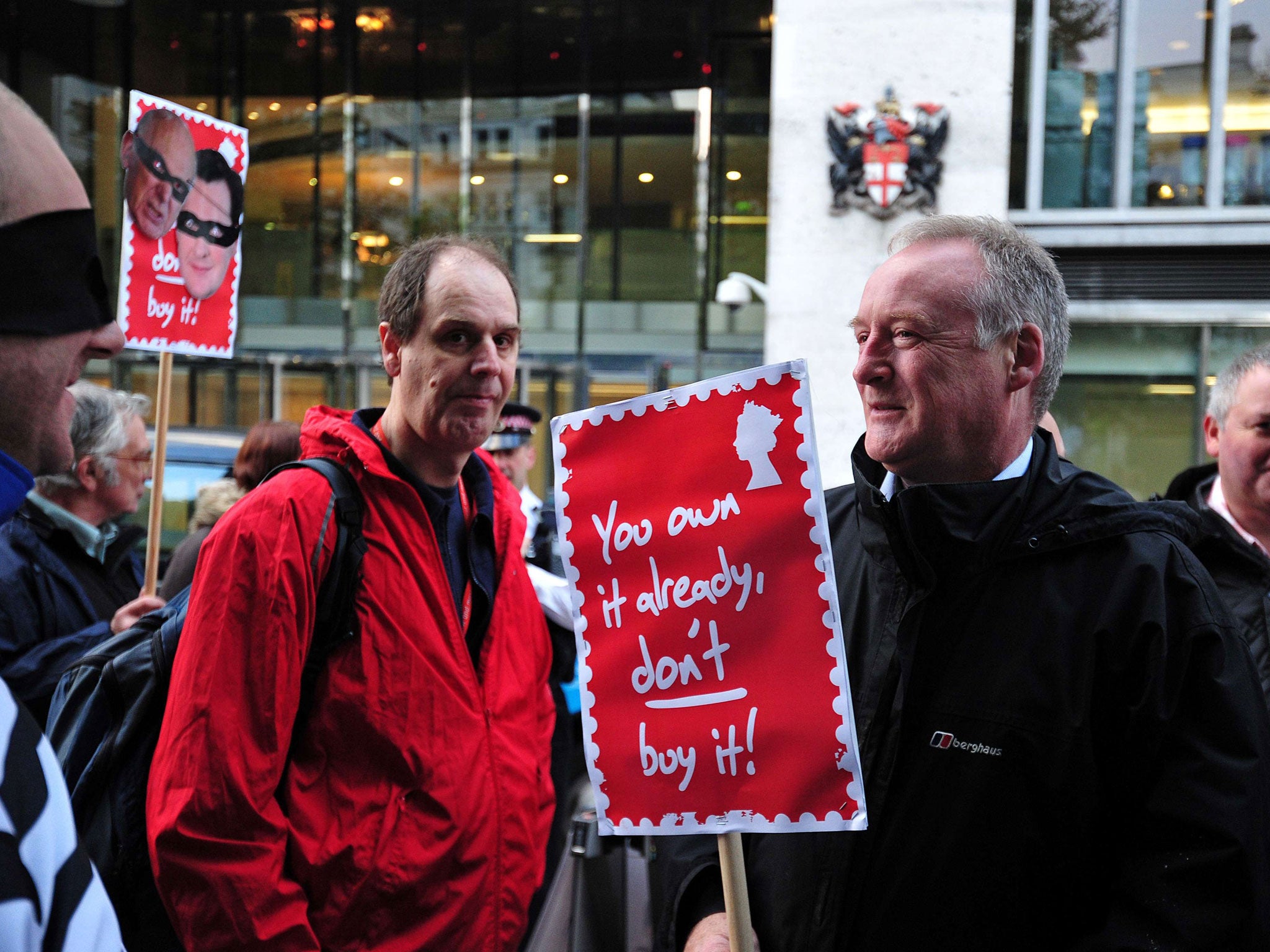Royal Mail flotation: Thousands cash in as shares soar 38% on first day
Labour complains of ‘fire-sale at knock-down price’ as small investors celebrate £285 windfalls

The Government stood accused of losing the taxpayer nearly £650m from the Royal Mail flotation as the company’s shares surged 38 per cent on their first day of trading.
Members of the public who bought shares were sitting on windfalls of £285 each, with thousands choosing to sell their stock in the first day of conditional dealing.
Postal workers’ free shares were worth a total of £455m by the end of the day, while the business as a whole – including the stake being retained by the government - was valued at £4.55bn. That was some £1.3bn more than it was valued at by the flotation and makes it big enough to enter the FTSE-100 Index.
Far bigger profits were being enjoyed by institutional investors in the City and overseas as the shares rose from their sale price of 330p to a closing price of 455p. In total, the City institutions were booking a collective profit of £433m on the day.
The Royal Mail’s 11 board directors were also sitting on big windfalls, with their shares collectively up more than £40,000 on the day.
Trading was described as “frenzied” by stockbrokers, with the country’s biggest, Hargreaves Lansdown, suffering from a meltdown in its systems.
David Madden, Market Analyst at City investment firm IG said: “Royal Mail is seeing a throwback to the privatisation days of the 1980s. Some dealers booked early profits, but demand remained high throughout the day.”
He added many investors were angry the public was not given a bigger portion of the shares, saying the government appeared to be favouring institutional investors.
Thousands of members of the public who ordered more than £10,000-worth were awarded no shares at all, while those requesting between £750 and £10,000 were all awarded a flat £750-worth.
Retail investors are allowed to trade through their brokers until full trading begins on Tuesday, meaning all members of the public can trade through their tax-efficient ISAs.
The share issues: A winner, a loser and a conscientious objector
James Greenbury: Chief Executive of Parcels2Go.com
He spent his career in post, in the past running the City mail service DX – which was born out of Royal Mail strikes. So when Royal Mail’s privatisation loomed, he “knew it was undervalued” and applied for £60,000-worth of shares. But the decision to block investors applying for more than £10,000-worth of shares means he missed out.
“I knew it was undervalued from the go, and put my application in as soon as I could,” said Greenbury, who is 52. “Now I just think that instead of going through all this effort and paying millions in advisory fees to investment banks, the Government should have given all adults in the UK a small proportion of the shares directly. It would have avoided wasting all this money, and uncertainty, and given everyone back what they originally owned.”
Michael Cave: 33-year-old entrepreneur, a South African living in London
I’m really pleased I got them. I’ve never taken part in an IPO before but with this one I just knew it would be a good one to get in on. I’m a big believer in psychology of the markets and when I read all this stuff in the media saying: “It’s priced to go, it’s priced to go”, I knew the shares would rise so I had to make a bid.
I applied for £3,000 but, to be honest, I never expected to get that much so I’m not too disappointed.
At this stage I will hold on to them and see what the market action is over the next few days, but the fact that they were so much oversubscribed suggests the price won’t fall too much from here.”
Paul Firmage: Postman
He admits to being tempted by the prospect of a £2,000-plus windfall by taking up the offer of free shares but he looked the gift horse in the mouth – and became one of the 368 of the 150,000 Royal Mail employees who refused shares.
Mr Firmage, from Downham Market, Norfolk, said: “I can understand people taking the money – it’s attractive – but some things are above profit. I thought long and hard about it… I decided that I wasn’t comfortable with it.”
Join our commenting forum
Join thought-provoking conversations, follow other Independent readers and see their replies
Comments
Bookmark popover
Removed from bookmarks